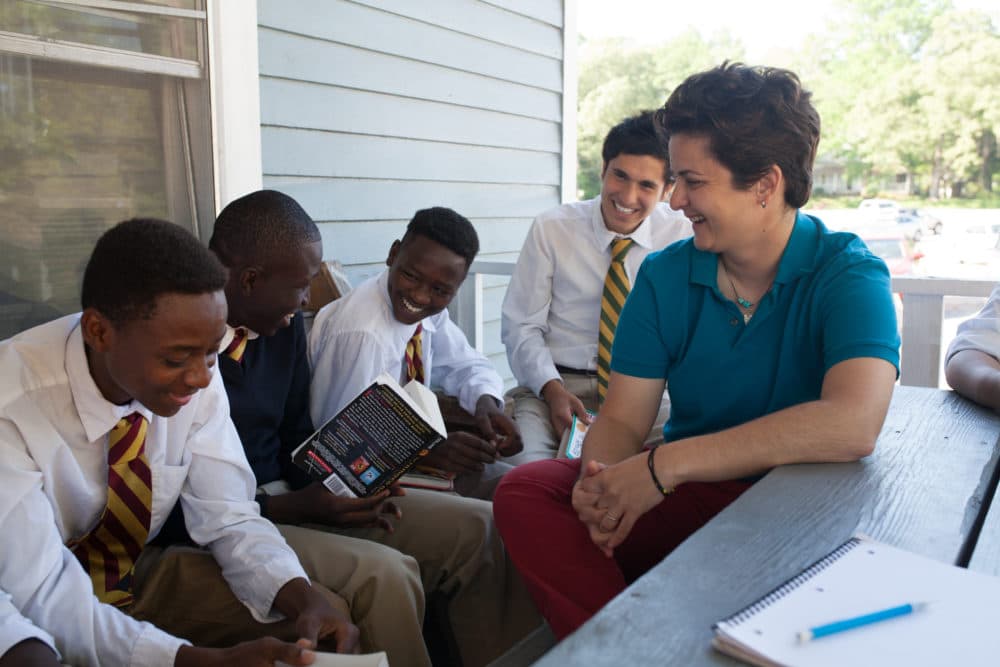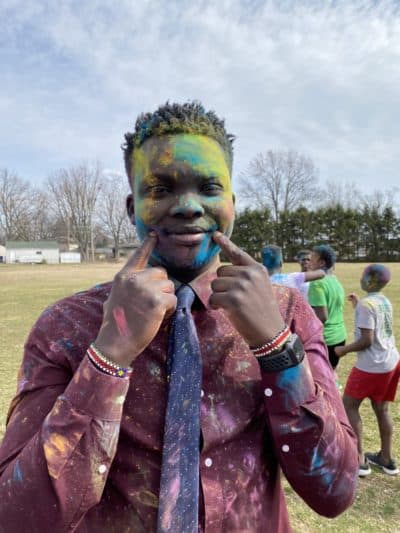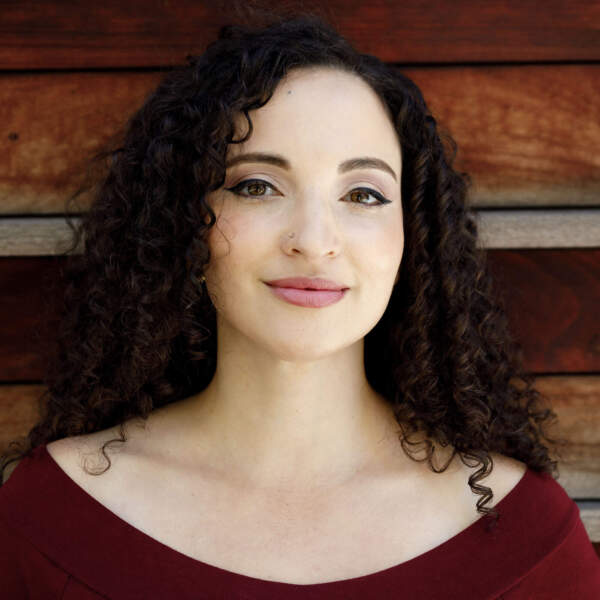Advertisement
How A Simple Game Led To A Mission To Educate Generations Of Young Refugees
Resume
(Listen to this story starting at 5:20 on the Kind World Podcast episode #COVIDKindness & Building A Winning Team)
Luma Mufleh always loved soccer. She grew up around a huge extended family in Jordan, where she and her cousins played in her grandmother’s backyard.
"She had tortoises, so we'd set up the tortoises as soccer goals and an hour into the game, the goals would have shifted because the tortoises would have moved," Luma reminisced. "That's where I take myself when I think of home."
In the 1990s, Luma left Jordan and went to the U.S. for college.
After four years at Smith College in Massachusetts, she made the decision not to return home.
"My junior year, I applied for political asylum," Luma said.
From an early age, Luma knew she was gay. She also knew it would be difficult to live as a gay woman in a socially conservative country. Currently, Jordan doesn’t have explicit laws criminalizing same-sex relationships, according to Human Rights Watch. But sometimes, the reality on the ground is different.
"I was caught at one point with with another woman outside of Amman and [I was held] at gunpoint and threatened with rape," Luma said. "It's like a fear, but a reality as well."
In 1999, Luma was granted asylum. She moved to Atlanta, opened up a cafe and started coaching club soccer. Despite her best effort to live a normal, full life, something was off. Luma missed home, even though her parents had disowned her after she came out.
"When you have to leave your country, there's a part of you that's always going to feel lonely," she said. "Even if you're having a great day, there is a part of you that is missing."
On one hand, Luma felt free as a gay woman in the U.S. On the other, she felt like she had to hide another part of her identity — especially after the Sept. 11, 2001 attacks.
"Lots of friends start changing their names, you know — like Saeed became 'Sam,' Mohammad became 'Mo,' " Luma said. "Seeing the way people reacted and the fear they had when they realized you were Arab and Muslim was not the way I wanted people to look at me."
Advertisement
Often passing for white, Luma did her best to blend in. But deep down, her nostalgia for home never went away. It really hit her one day when she came across a group of young boys who were all refugees playing soccer, and something told her she had to stop.
"Maybe it was fate," Luma said. "Like here's part of your world, and we're going to plant it right here in Atlanta for you."
The next day, Luma went back to play a quick soccer game with the same group of kids. Lewis Makor, a shy teenager from South Sudan, was often part of that group. His family immigrated to escape political violence, but for Lewis — a kid who didn’t speak much English — life in America was difficult.
"I didn’t have that many friends," Lewis said. "It didn’t feel like home and it didn't feel like this was the place I was dreaming of when I first got here."
That changed when a group of boys approached him and asked if he wanted to play soccer with them.
"It was a little bit emotional but at the same time, I was excited because I had kids trying to include me into something," Lewis said.
Luma volunteered to coach this group of boys as an official soccer team that would compete with other area teams.
Coach Luma — as she became known — would stay after practice to help her players with their homework. That’s when she learned something startling: some of them, like Lewis, had trouble reading.
"It shook me in a way that I don't think I was prepared for. I just didn't think you could be in school for a number of years here in the United States and not know how to read," Luma said. "I said to myself, 'If this was my kid, what would I do?' "
Luma decided to open a makeshift school for six middle schoolers on her team to help them catch up on academics. Class took place in a rented room in a church basement. Luma used her own savings to hire a teacher, who homeschooled Lewis and his teammates for the next three years. By the end, Lewis said he went back to his public high school a changed student.

"It gave me confidence in front of the class to read," he said. "Sometimes I’d raise my hand to tell the class, I'll read first."
Luma's idea grew. In 2007, she started a nonprofit called The Fugees Academy, a free private school for low-income refugee children.
"A lot of people didn't believe in it," Luma said. "I had a principal of another school tell me I was wasting my time on these kids, that they would never amount to anything."
It's a good thing she didn’t listen, because since starting the school in Clarkston, Georgia, Luma has helped teach nearly 1,200 middle and high school students. She opened up a second location in Columbus, Ohio in 2018. That’s where Lewis, now 27, is back in the classroom. This time, as a leader and mentor.
"They’re living my life when I was a kid and I want to make sure they have the best of it," Lewis said.
Luma said one of the most rewarding things during her career at Fugees has been watching Lewis, a once timid kid, lead the school's assemblies.
"I'll sit back and see that image of him standing up in front of a group of kids and mentoring them and guiding them and coaching them, and it's beautiful to see," Luma said.
Through teaching others, Luma said she too has learned an important lesson. Coming out as a gay woman to her family and students was nerve-wracking. Then again, so was coming out as an Arab Muslim asylee to many others in her community. Over the years, Luma has been teaching her immigrant students to be proud of their identities, and she's embraced every aspect of hers.
"I feel very more whole when I'm at school and when I'm in the building with my kids," she said. "I feel more like I feel that I belong now, in a way that I didn't not before."
